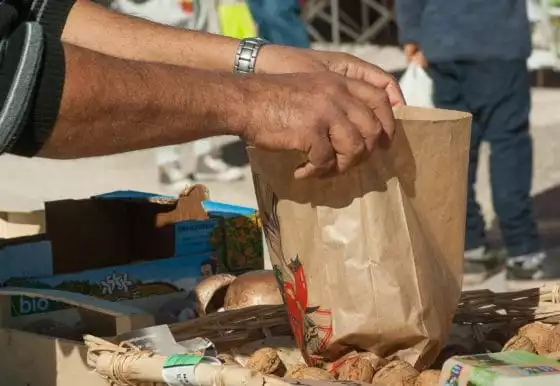Street Vendors Legal in L.A.: 5 Things to Know
Update: Is Street Vending Legal In Los Angeles?
After facing an uphill battle for years to run their businesses, street vendors will soon be allowed to operate on the sidewalks of Los Angeles.
The L.A. City Council voted in February to decriminalize street vendors, though there are still a few i’s to dot and t’s to cross. It’s estimated that nearly 10,000 street vendors operate on Los Angeles sidewalks, although it’s a misdemeanor offense under Los Angeles Municipal Code 42.00(b).
Now that street vending is legal, what does it mean for the city of Los Angeles? Here are five things to know.
1. Regulations are still being developed on street vending.
Just because it’s now allowed doesn’t mean that everything’s final. The City Council also voted to approve a series of proposed concepts on how to regulate street vending, as a compromise from an initial position of a blanket set of rules for every vendor in the city. A majority of business and property owners would be able to petition to have street vending blocked from certain areas. An additional provision would require vendors to have majority support of businesses in the area before setting up shop.
What does this mean for street vendors? While the ordinance to decriminalize their work was a huge victory, they will need to continue to work with the community and government agencies on approving their particular business in the location they want to sell in.
The City Attorney’s Office and city staff are working on developing a detailed ordinance that should return to the City Council for approval by summer 2017.
2. You may not see any street vendors in your area.
As mentioned above, street vendors will be at the mercy of other local businesses before they are allowed to operate in their vicinity. Additionally, proposals to the City Council would require the city to set permit fees at a high enough level that it can cover the cost of enforcing the regulations (aka, pay for police work).
Business owners in a particular area, or the cost of the fees themselves, could be a potential barrier to street vendors. Many lack the capital to set up a brick and mortar, so it’s unclear how the permit process will affect some vendors. Businesses that had opposed earlier legislation proposals, however, are happy they have a say in determining what types of businesses and how many operate on sidewalks outside their front doors.
A Community Impact Statement by the Encino Neighborhood Council, for example, suggests a maximum of four vendors per mile, limited to commercial streets, parks, and transit hubs. Vending also shouldn’t be allowed within 500 feet of schools or on strictly residential streets, the organization says.
3. Vendors selling now can still be cited.
Because the rules around street vending are still being determined, vendors can still be cited and fined for violating the municipal code, but wouldn’t face criminal convictions. This is a heated issue, as immigrant advocates have argued that street vendors shouldn’t face criminal charges that could place them at risk of being deported. A few L.A. City Council members brought up the decriminalization of street vendors in January, fearing a national crackdown of immigrants after President Trump took office.
A first-offense citation of street vending is a $250 fee, a second offense is $500, and further offenses rack up $1,000 each. According to the city attorney’s office, about 22 people were convicted or pled guilty to a misdemeanor for engaging in illegal street vending in the last year; 13 cases are still pending, and there are additional cases where the defendant failed to appear in court. The fates of those vendors could still be up in the air.
Street vendors previously could also get jail time for offenses. The amended ordinance, however, makes the violation only punishable by a citation, per the reason of police needing to devote their resources to more serious crimes.
4. Food trucks are not the same as street vendors.
Because street vending hasn’t been legal, it hasn’t been regulated. Food trucks and carts, while seen as on a similar level to street vendors by some, are regulated as a Mobile Food Facility by the LA County Health Department. The health department’s Vehicle Inspection Program conducts annual certification inspections, routine graded inspections, and complaint inspections, while Mobile Food Facility operators must provide updates to their route and location or risk losing their public health permit.
Mobile Food Facilities include some smaller operations, such as hot dog carts, coffee carts, and churro carts.
The East LA Community Corporation, which advocates for street vendors, hopes to develop a nonprofit infrastructure to support these entrepreneurs, along with creating spaces for vendors to work legitimately at farmers markets or within the Boyle Heights New Community Plan Update.
5. Consumers expect food sold on L.A. sidewalks to be safe.
Street vendors don’t just sell food, but also goods. It’s important to know that if you buy something from a street vendor, what you’re going to eat or take home is safe.
Selling food on a sidewalk in L.A. was still illegal before the amended ordinance, after all, despite many vendors complying with LA County Health Department’s food preparation standards. Some consumers continue to be concerned with safety.
According to a Community Impact Statement submitted by Empowerment Congress Southwest Area Neighborhood Council, a survey of the 8th District found that the majority of constituents did not want street vending and were not in favor of vendor district designations. Ninety-five percent of respondents were concerned with regulation, enforcement, health, and safety of the general public. Many also felt that street vending would be a community eyesore, contributing to traffic and litter problems.
Are you a street vendor facing misdemeanor charges? We may be able to help
If you are a street vendor who has faced misdemeanor charges and you also are an immigrant, the San Fernando Valley Bar Attorney Referral Service can help you find an attorney to handle your immigration case. Immigration law deals with everything from deportation proceedings to obtaining citizenship or work authorization, obtaining a green card, applying for asylum, and more.
Immigration law is complicated. You have rights, and a safe way to speak to an attorney. Contact us today for a free case evaluation.
Are you in search for a certified attorney to represent you?
Let us help you find one today!





Is it legal to have a deep fryer set up with propane as a street vendor ?
Jayda,
It would depend if a deep fryer is on the list of unapproved food equipment. For more information, consider contacting the Los Angeles County Street Vending Compliance Program: (626) 430-5160
Is it legal for a street vendor selling fruit and juice to set up table and fruit stand on the corner of a residential street?
Hi Gina,
Take a look at this page of the LA County website for details regarding requirements and restrictions → http://publichealth.lacounty.gov/eh/AreasofInterest/food.htm